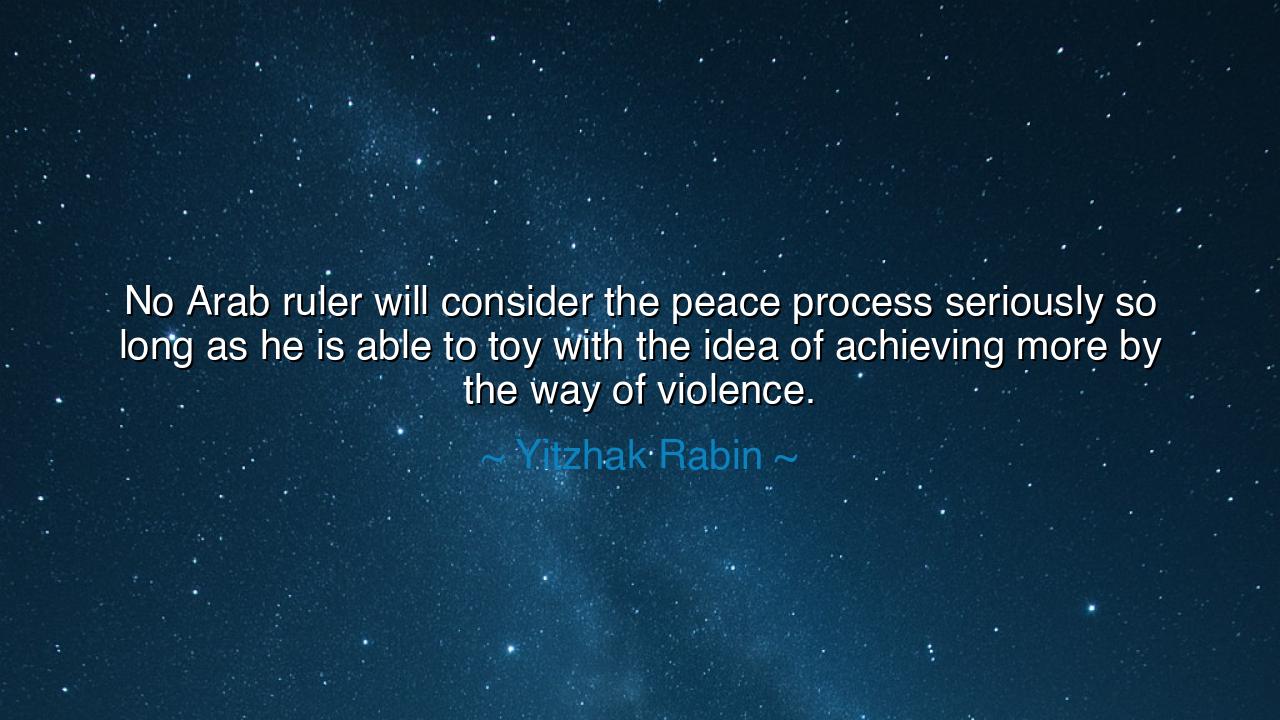
No Arab ruler will consider the peace process seriously so long
No Arab ruler will consider the peace process seriously so long as he is able to toy with the idea of achieving more by the way of violence.






Hear the grave yet steady words of Yitzhak Rabin, soldier turned statesman, peacemaker forged in the fire of battle: “No Arab ruler will consider the peace process seriously so long as he is able to toy with the idea of achieving more by the way of violence.” In this warning, there is both lament and wisdom. Rabin, who fought in Israel’s wars yet later signed accords in search of peace, understood the eternal tension between the lure of power and the discipline of reconciliation. He knew that as long as men believe that violence can bring them greater gain than compromise, they will turn away from the harder road of peace.
The meaning of his words is plain, yet it burns with truth. Peace is not born when treaties are signed with ink alone, but when the mind and heart are convinced that negotiation is more fruitful than the sword. If a ruler sees bloodshed as a profitable path, he will not seek dialogue. If war promises territory, glory, or power, then peace becomes a shadow, dismissed as weakness. Rabin warns us: true peace can only emerge when all parties are disillusioned with violence, when they see that destruction offers no harvest worth reaping.
The origin of these words lies in Rabin’s own journey. He was Israel’s chief of staff during the Six-Day War of 1967, a man of arms who had seen the cost of battle and the allure of victory. Yet in his later years, he turned toward reconciliation, negotiating with the Palestinians in the Oslo Accords. He spoke these words not as a naïve dreamer, but as a hardened realist who knew both sides of the battlefield. His wisdom was born of experience: rulers will not relinquish the sword until they are convinced the sword brings them nothing but ruin.
History echoes Rabin’s truth. Consider the endless wars of Europe in the seventeenth century. The princes and kings fought for lands and crowns, convinced they could gain more through battle than through agreement. Only when the blood of decades had exhausted them, when famine and plague laid waste to their people, did they finally craft the Peace of Westphalia, realizing that war no longer yielded profit, only devastation. The lesson was the same: peace is embraced not when it is beautiful, but when it is finally more profitable than violence.
Or think of Gandhi’s struggle against the British Empire. For years, the rulers dismissed peace, for they believed that repression would yield them more than dialogue. But when Gandhi’s nonviolence stripped the empire of moral authority and revealed the futility of brutality, Britain at last yielded. They saw that to cling to violence was to lose more than they could ever gain. Thus, peace entered only when rulers realized its superiority over bloodshed.
The lesson for us is not only for nations but for individuals. In our own lives, too, conflicts endure as long as one party believes they can gain more through anger, manipulation, or harm. Peace comes only when both sides see that destruction robs them of more than it gives. Thus, if we desire peace in families, communities, or nations, we must strip violence of its illusions. We must make clear—through courage, patience, and steadfastness—that peace offers life, while violence offers only decay.
Therefore, let us take Rabin’s words as eternal counsel: if we would see peace flourish, we must remove the false rewards of violence. Nations must learn that conquest brings ruin; families must learn that anger poisons love; individuals must learn that revenge leaves the heart empty. Only then will men and rulers alike turn their gaze from the sword to the table of reconciliation. And when that day comes, peace will no longer be a dream, but a reality—born not from weakness, but from the recognition that violence is an illusion, and peace is the only true strength.






NTDieu Hien Nguyen Thi
This quote makes me wonder about the larger dynamics at play in the Middle East. If leaders are continuously holding onto the idea that violence might yield better outcomes, how can any lasting peace be achieved? Rabin seems to point to a lack of true commitment to peace, but could there be other factors, such as internal political pressure, that prevent rulers from fully embracing peace even when they seem ready to do so?
LTLien Tran
I find this quote to be thought-provoking but also somewhat disheartening. If leaders believe violence offers more leverage than peace, it creates a never-ending cycle of distrust and retaliation. How do you break out of that cycle? What role does international pressure or mediation play in convincing these leaders to prioritize peace over violence? Is the current international system equipped to handle such deeply entrenched beliefs?
Kkokonut
Rabin’s perspective suggests that the threat of violence is a powerful motivator for many rulers, especially in regions where conflicts are deeply rooted. But does this really mean they won't take the peace process seriously? Could it be that the peace process is just as much about strategic positioning as it is about genuine desire for peace? Can peace even be attained when military strategies remain a potential path to power?
TNHong Tham Nguyen
Yitzhak Rabin’s statement seems to highlight the ongoing tension between diplomacy and the use of force in the Middle East. It raises an interesting question—does the possibility of violence undermine peace efforts, or is it an unfortunate reality that peace cannot be achieved while such options are on the table? How do you convince leaders to put down arms when they feel their power or goals could be advanced through violence?